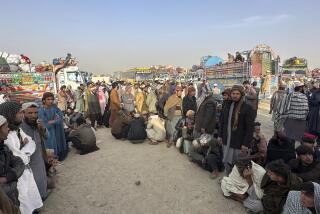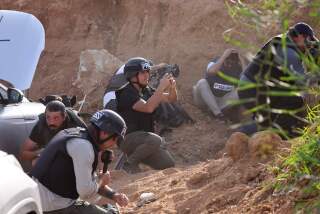Invasion of a Different Sort Covers Jalalabad
- Share via
JALALABAD, Afghanistan — They’d spent days haunting Peshawar’s musty government offices, forgotten chambers stacked to the ceiling with sodden, twine-bound piles of paper. They’d stared at the makeshift filing system and waited in endless lines. More than once, they’d agreed frostily to come back tomorrow.
But on Saturday afternoon, the car trunks slammed and the old buses shuddered to a start and the journey to Afghanistan from the Pakistani city began at last. The convoy careened around soothsayers and horse carts in a squall of car horns until urban Peshawar gave way to shacks, then to open fields.
The mountains emerged from the haze, and the cars climbed up. This was the Khyber Pass, storied old route of smugglers and marauders, trail to Afghanistan.
The journalists--200 reporters, photographers and producers--were bound en masse for the Afghan city of Jalalabad, escorted by exiled anti-Taliban warrior Haji Mohammed Zaman. He had returned to the region after Sept. 11, eager to watch the Taliban crumble--and ready to reclaim lost status, land and nationality.
After Kabul fell last week, Zaman made his move. He and his fellow Pushtun commanders took over the royal summer palace in Jalalabad, summoned tribal elders from all over the Afghan east and set about building a new government.
And he had agreed to bring some guests with him. Through the Khyber Pass, villages flashed past: mud huts, skinned chickens, barrels of dates and nuts.
“These places are full of drugs,” said the head of an Afghan nongovernmental organization.
Outside Shergai fort, men pounded through a field hockey match in a haze of sinking sun and rising dust. “Dead slow,” ordered a traffic sign. Emblazoned on the rear of a bus crammed with newspaper reporters were the words, “Cruising sweet, massage next time.”
When the convoy shuffled to a stop at the Torkham crossing between the two countries, day still hung from the sky. On the dirt slopes that led down into Afghanistan, men and boys stood waiting for dark. They hadn’t eaten, but when the sun set, they’d break their Ramadan fast.
“You have one dollar. You give me one dollar. I am very poor,” the children begged journalists. A goat chewed wearily along a gutter--the rest of the street stayed hungry.
Border-Crossing Feast Begins After Sundown
When darkness came, cooking fires were lighted in sheds along the street. The Muslims slumped in relief. Bread dough and meat sizzled.
When the feast wound down, the journalists went back to the business of moving 50 yards into Afghanistan. In an office by the crossing, a long fan of passports stretched along an old wooden table, and a lone man pecked at a typewriter. An hour dragged by. Almost all of the passports were stamped. Afghanistan seemed near.
Then the rumors began. A CNN team rushed in, flushed and flustered. They’d just phoned headquarters and had been ordered to stay out of Jalalabad. There was chaos and bloodshed, they’d been told. Soon, airstrikes would begin.
The journalists muttered and frowned. Stalled on the remote mountain pass, they’d had no news in hours. Everyone hesitated.
But it was too late. According to official documents--and recent days had taught everybody that official documentation looms large in Pakistan--the journalists had already left the country. After days of clamoring to leave, they looked at exit visas that had taken on an inhospitable tone: goodbye.
The black Khyber Pass loomed behind, and the gate to Afghanistan loomed ahead. There was no choice but to press on.
The cars spilled into Afghanistan; the turbaned Taliban no longer manned the gate. On the edge of the warring nation, the stars were dull and dense. Forty soldiers waited to escort the convoy, boys and young men nestled into pickup trucks. In the chilly autumn night, they shuddered and gripped grenade launchers.
Past a deserted bazaar the cars crept, past shops and homes so rickety they could have been built from old matchboxes. The road cut deeper into Afghanistan along the Kabul River, past mountains, tobacco fields, tractors. In the beds of their trucks, the boys with guns smoked cigarettes and squinted to keep the blowing ash from their eyes.
Closer to Jalalabad, they passed a decrepit refugee camp, and the deserted dinosaurs of Soviet tanks. Electricity and telephone lines sprang up. The Jalalabad airport rose on the left.
When they reached the royal palace, built by former monarch Mohammad Zaher Shah, the cars pulled up short. The journalists were rushed past a throng of armed men, through the palace gates and along the darkened path of the exiled king’s gardens. They followed stone steps to a drawing room glittering with chandeliers, carpet upon carpet, Byzantine murals.
The news conference was about to begin.
More to Read
Sign up for Essential California
The most important California stories and recommendations in your inbox every morning.
You may occasionally receive promotional content from the Los Angeles Times.













